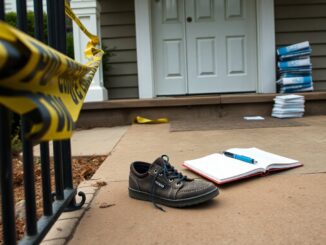The vandalism of a war memorial in Artigarvan reveals deep-seated community tensions.

Topics covered
The recent vandalism of a war memorial in the village of Artigarvan, Co Tyrone, has raised urgent questions about sectarian violence and the state of community relations. As locals come to terms with the implications of this act, we need to step back and think about the broader context of such incidents and their impact on societal cohesion.
What does it say about our communities when they can be shaken by such acts?
Understanding the Incident
Local police have classified the damage to the war memorial as a sectarian hate crime, with reports detailing significant vandalism, including the decapitation of sculpted soldiers and the theft of a flag.
Members of the Artigarvan New Hall community organization have called the act “absolutely disgusting,” highlighting the emotional toll on communities that honor their shared history. This memorial is a poignant reminder of collective sacrifice during the great wars, so this vandalism feels like more than just an attack on property; it’s an assault on the community’s collective memory.
The incident, which happened on Leckpatrick Road, has sparked outrage and condemnation, underlining the necessity for a thorough investigation. Community leaders have voiced their dismay, pointing out that the actions of the perpetrators reveal a troubling disregard for the values of respect and remembrance. This outcry goes beyond the physical damage; it serves as a window into the underlying tensions that still linger in the region. Why are we still facing such divisions after all this time?
The Broader Context of Sectarian Tensions
To truly grasp the implications of this act, we must consider the historical backdrop of sectarianism in Northern Ireland. While significant strides have been made since the Good Friday Agreement, incidents of sectarian violence continue to occur, often fueled by deep-rooted animosities and community divisions. The data tell a troubling story: despite advancements in peace-building efforts, certain areas remain volatile, with incidents like this serving as painful reminders of the long road ahead.
Moreover, the emotional and psychological fallout from such vandalism extends far beyond immediate outrage. For many community members, these acts can reopen old wounds and heighten fears of a return to violence. This incident starkly illustrates that the journey toward reconciliation is fraught with obstacles, and constant vigilance is essential to ensure that progress isn’t undone by hate-fueled actions. How do we move forward when the past continues to haunt us?
Lessons for the Community and Beyond
The vandalism of the war memorial carries several lessons for communities wrestling with issues of division and sectarianism. First and foremost, it underscores the necessity of community engagement and open dialogue. Building a shared understanding of history and nurturing strong inter-community relationships are vital steps in preventing such acts of hate. Community leaders must actively create spaces for discussion that tackle grievances and promote inclusivity. What would it take for communities to come together instead of being torn apart?
Additionally, this incident emphasizes the role of local authorities in addressing hate crimes. Quick and decisive responses not only address the immediate damage but also reassure the community that such actions won’t go unpunished. It’s crucial for law enforcement to connect with community members, fostering trust and collaboration in the battle against hate-driven violence. How can we ensure that communities feel safe and supported?
Actionable Takeaways
For communities facing similar challenges, here are some actionable steps that could make a difference:
- Establish regular community forums to discuss historical grievances and promote healing.
- Encourage local organizations to take active roles in community preservation and education.
- Develop partnerships with law enforcement to strengthen trust and response strategies.
- Implement educational programs in schools that promote understanding and respect for diverse histories.
In conclusion, the vandalism at the Artigarvan war memorial serves as a sobering reminder of the work still required to foster peace and reconciliation in communities impacted by sectarian tensions. By confronting these issues directly and learning from such incidents, communities can take meaningful strides toward a more inclusive and harmonious future. Are we ready to rise to the challenge?




